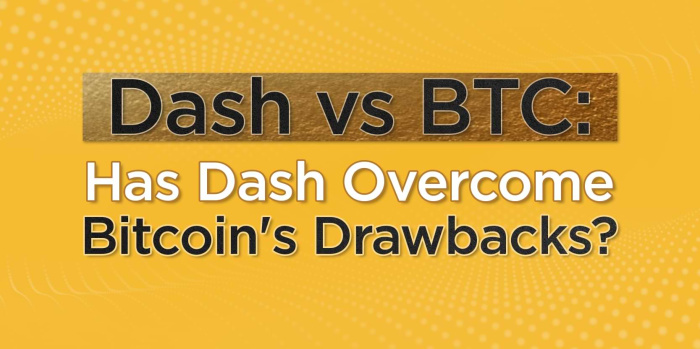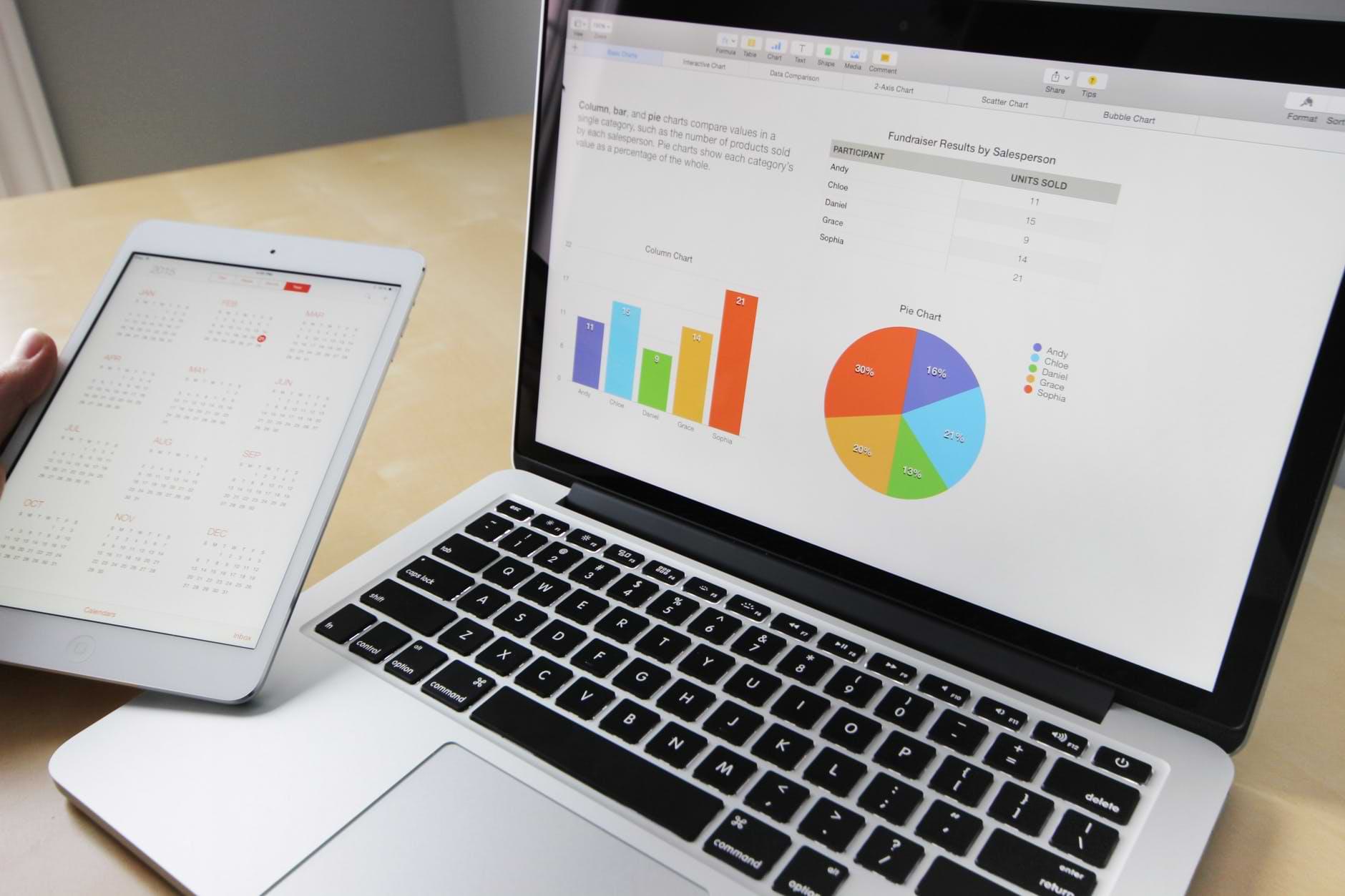
Dash vs. BTC: Has Dash Overcome Bitcoin's Drawbacks?
Cryptocurrency has emerged as the new face of money in recent years. People are increasingly investing in these currencies because they are more secure and provide greater long-term profits than paper currency. These currencies are based on blockchain technology, which ensures that all users' accounts are secure and that it is nearly impossible to hack or freeze someone's account.
The cryptocurrency market's cap has nearly quadrupled in the last year, to $160 billion, confirming the expanding market cap trends for this technology since its start. However, with so many new cryptocurrencies emerging in recent years, some people are confused about their differences and which is the best.
Even though Bitcoin was created in 2010 and had a stranglehold as the market leader, numerous competitors, such as Dash network, are presenting alternatives that are causing prospective users to reconsider. This is why clashes among these cryptocurrencies have emerged, like the infamous Bitcoin vs Dash debates. Evan Duffield created Dash’s self-funded blockchain in 2013 after noticing a few fundamental flaws in bitcoin's technology, notably a lack of privacy and speed. He hoped that by creating Dash, he would be able to fix both problems while also adding new functionality.
Cryptocurrencies operate and maintain themselves in different ways. Even their structure differs significantly. They are, however, a trustworthy cryptocurrency in the end. Of course, to explore their differences and answer the question of whether or not Dash has already surpassed Bitcoin and in addressing the Bitcoin scaling debate, and overall the Bitcoin vs. Dash debate. Let's look at different aspects first.
Dash Vs. Bitcoin: Origin and Evaluation History

Bitcoin’s History
Bitcoin investors have had a turbulent ride for the most part during the last 13 years. They have had to cope with a raft of challenges influencing its environment, spanning from various scams and frauds to a lack of regulation that contributes to its instability, aside from everyday volatility, where common double-digit price spikes and declines. Considering this, there have been instances when cryptocurrency price variations have outstripped even their usual unpredictable swings, resulting in massive price bubbles.
The Bitcoin network had one of the most tumultuous histories in cryptocurrency trading, among others. The value of a single Bitcoin network grew from roughly $0.0008 to $0.08 in 2010, marking the cryptocurrency's first price increase. Since then, it has been through multiple rallies and crashes. Some have compared Bitcoin (and its price changes) to the Beanie Baby craze of the 1990s, while others have made comparisons between Bitcoin and the 17th century Dutch Tulipmania.
Bitcoin's price fluctuates between investor enthusiasm and frustration with its promise - which has been bitcoin’s weaknesses. After the 2008 financial crash, Satoshi Nakamoto, Bitcoin's creator, conceived it as a daily transactional medium and a mechanism to sidestep established banking infrastructure. Though Bitcoin has yet to acquire public acceptance as a currency, it is gaining traction as a store of value and inflation hedge.
Though this new story may hold more weight, previous price variations were mostly caused by regular investors and traders wagering on an ever-increasing price with little regard for rationale or facts. However, Bitcoin's price has recently shifted. After the cryptocurrency markets have matured, institutional investors are beginning to enter, and regulatory authorities are developing rules expressly for them. Though the price of Bitcoin remains unpredictable, it is now driven by a variety of factors in the mainstream economy rather than speculators seeking rapid profits through momentum trades.
Dash’s History
Dash was formerly known as Xcoin when it was launched in 2014. In March 2015, it was relaunched as Dash after being rebranded as Darkcoin. It was built to ensure user privacy and anonymity. The cryptocurrency's whitepaper describes as a secrecy currency based on Satoshi Nakamoto's efforts. Cryptocurrency's whitepaper became possible with the collaboration of Evan Duffield and Daniel Diaz
While it still has excellent encryption features, the company's goals have changed since then. Dash aspires to be a daily transactional medium as a digital currency that may be used like cash, a credit card, or PayPal. Dash cryptocurrency is a decentralized payment network that is part of an open-source initiative.
Trading dash aspires to be a daily transactional medium, and it has cast a wide net to achieve that goal. The digital cash payment startup expanded into Venezuela in 2018, marking the cryptocurrency's first excursion into a troubled economy. Since the virtual currency's inception years ago, demand for cryptocurrencies has exploded, as has the number of Dash users. The reason for this is the necessity for a transactional currency; Venezuela is now undergoing major civil turmoil and hyperinflation, to the point where the local currency (Bolivia) is effectively worthless.
By total capitalization in the market of $2.7 billion in May 2021, Dash places it as the 50th most valuable cryptocurrency in the entire world. Trading Dash cryptocurrency is worth $229.74 at the moment. This may already answer or give a conclusion about the Bitcoin vs Dash debates, but considering many areas we won’t yet be able to reach that point.
Dash Vs Bitcoin: The Main Differences

Algorithm
The algorithm that each technology utilizes to mine coins is the main difference between Dash and Bitcoin. Dash employs the X11 algorithm, which is a variant of the proof-of-stake (PoS) protocol. Conjoin mixing is also used to jumble a transaction history and provide privacy on its blockchain system. The proof of work (PoW) algorithm is used by Bitcoin.
Transaction Speed
Bitcoin, although being the oldest money, takes the longest to conduct a transaction. It has a slow transaction processing time. For instance, Bitcoin takes an average of 20 minutes to process, with many merchants demanding up to six confirmations before accepting a transaction. This can take up to an hour, and transaction speed has always been the common consideration in Bitcoin vs. Dash debates.
Dash, on the other hand, worked on this problem and now has a much shorter transaction period. Dash transactions take only a few seconds on average because of its instant transactions because Dash developers realized that users sought fast transaction confirmations. To address this issue, Dash developed InstantSend, a feature that enables instant payments. Payments are guaranteed to be instant and anonymous payments and are confirmed in around four seconds thanks to the decentralized technology. As a result, Dash is significantly faster than Bitcoin.
Transaction speed will become increasingly critical for face-to-face transactions as the popularity of cryptocurrencies grows, and lengthy transaction times will no longer be an option.
Transaction Fee
The cost of transactions is also one of the many areas when it comes to Bitcoin vs. Dash debates. Transaction costs in Bitcoin vary depending on a number of parameters, including block size and time of day. When a large number of transactions are waiting to be processed, for example, miners prioritize transactions that pay higher fees. Some consumers report that processing a single transaction costs a few dollars or more. Users of Bitcoin can postpone transactions until later in the evening or on weekends when transaction costs are reduced, but this adds another layer of complication to regular transactions.
Transacting with Dash costs substantially less – generally pennies rather than dollars. For example, Dash has lowered its average transaction cost to a one-year low ($0.0264), exceeding other cryptocurrencies such as Litecoin and Ethereum, while also achieving an all-time high number of transactions per day (nearly 35,000).
Privacy Features
Many cryptocurrency users value the fact that it is a private and safe way to conduct transactions. Bitcoin is considered to be anonymous. However some argue that this is insufficient because Bitcoin’s deficiencies include its history of transactions being visible to everyone. Dash introduced PrivateSend transactions, which are a coin-mixing facility that Dash includes as a privacy feature. The technology seeks to increase transaction privacy and security by preventing transactions from being traced back to the people involved.
Community
Cryptocurrencies have the advantage of not being governed by a centralized organization such as a government or financial institution. The governance systems of bitcoin and Dash, on the other hand, are very different. Bitcoin, for example, is governed by peer review. Changes can be made, but only if the most active contributors reach a rough consensus. As a result, making key decisions has become more difficult.
Dash, like Bitcoin, is not governed by a central authority, but there is a formal voting system in place. There isn't a long, tense argument when adjustments are required. Instead, a vote is held, a decision is reached, and action — or inaction — is performed in a short amount of time.
Investment
Both organizations have different organizational structures. Bitcoin is an open-source cryptocurrency in which all shareholders have the same amount of authority. As a result, no one, including the government, can control or influence the blockchain network. Dash, on the other hand, is run by a self-funded “DAO.” This organization uses the self-controlled blockchain protocol. As a result, Dash can be changed, whereas Bitcoin is nearly impossible to change.
Node Structure
Each system connecting to the blockchain in bitcoin is referred to as a node. Furthermore, all nodes have equal authority and hold the most power in the blockchain. Some Dash master nodes, on the other hand, are solely descended from Decentralization autonomous organizations. These nodes have a higher power in Dash's blockchain technology and contribute to the project's development.
Address Concerns
Dash assigns a simple username to each account. As a result, transferring the funds to another person is simple. Bitcoin, on the other hand, assigns a long-string username that is difficult to remember and type. At this time, the globe is awash in cryptocurrencies. Each has a distinct working style and level of trustworthiness. However, bitcoin is currently the most trustworthy cryptocurrency, whereas Dash is currently ranked as the 13th most trustworthy currency.
Despite the fact that Dash is a more advanced form of Bitcoin, it is still a long way behind it in the market cap. Both cryptocurrencies are incredibly respectable and have a bright future ahead of them. Because Dash has been unable to attract significant investors, Bitcoin is more trusted in the market cap. As a result, you have the option to pick between the two.
Blockchain
Dash is based on a more advanced version of blockchain that is self-governing and self-funding. As a result, unlike Bitcoin, it has a blockchain that is maintained by an organization.
Dash Vs. Bitcoin: Bitcoin Scaling Debate
Bitcoin faces increasing barriers, plummeting by more than half from its April high of over $65,000. The price of bitcoin is still much higher than it was when it began its most recent surge in October, a bull run that pushed the total crypto market to a breathtaking $2.5 trillion before plunging.
Bitcoin development will also most likely supplant the US dollar as the dominant form of global finance by the year 2050, according to a panel of particular cryptocurrency experts, putting the bitcoin price at just over $66,000 by the end of 2021. Some countries will almost certainly adopt bitcoin as their primary currency. It will suit them well to migrate to a 'bankless' model inherent in this environment, given the fixed circulation and ease of transfer.

The bitcoin price, on the other hand, is expected to fall further before reaching a floor, with a consensus of $25,000 per bitcoin, down roughly $8,000 from its present price of around $32,000. While 54 percent of panelists surveyed by a personal finance comparison site believe bitcoin will eventually overtake fiat currency by the year 2050—a process known as "hyperbitcoinisation"—44 percent, including University of Western Australia associate professor Lee Smales, do not believe bitcoin will ever become the dominant form of global finance.
Bitcoin and other cryptocurrencies will eventually lose ground to central bank digital currencies, many of which will be operational by the end of the decade. Furthermore, one of the strongest arguments for a digital dollar is that it would eliminate the need for bitcoin, other cryptocurrencies, and so-called stablecoins, which are digital currencies tied to traditional assets like tether.
Bitcoin Transactions Vs Dash Cryptocurrency and Other Cryptocurrencies
The simplest way to approach the concept is to determine the value of Bitcoin's projected proportion based on the present global value of all mediums of exchange and all repositories of value equivalent to Bitcoin. Government-backed money is the most common exchange form, and we shall use it exclusively in our model.
M1 (which includes M0) is worth roughly $4.9 trillion at the moment, which will serve as our current global value of mediums of exchange. M3 (which covers all other buckets) minus M1 is estimated to be worth $45 trillion. Assume it includes this as a similar store of value to Bitcoin. We'll also throw in a guess for the global worth of gold held as a store of value. Although some people utilize jewelry as a store of value, we will solely consider gold bullion in our model.
According to the US Geological Survey, roughly 122,000 metric tons of accessible above-ground gold by the end of 1999. Private and official bullion stocks accounted for 48 percent of the total, or 58,560 metric tons. That amount of gold is now worth upwards of $2.1 trillion at an estimated current price of $1,200 per troy ounce.
We think that most silver is employed in industry rather than as a store of value, and we will not include silver in our model because there has been a supply imbalance in recent years. Governments have been selling considerable amounts of their silver bullion. We shall not treat other precious metals or gemstones in the same way. In total, we estimate the global worth of stores of value comparable to Bitcoin to be $47.1 trillion, which includes savings accounts, small and large time deposits, money market funds, and gold bullion.
The overall value of global mediums of exchange and repositories of value, according to our calculations, is $52.1 trillion. In today's money, Bitcoin's market cap value would be $10.8 trillion if it achieved 15% of this valuation. The price of one bitcoin would be $514,000 if all 21 million bitcoins were in circulation.
Dash Vs. BTC: Has Dash Overcome Bitcoin’s Drawbacks?
Dash did exceptionally well in 2017. If you had put $10 in at the start of 2017, it would have increased to roughly $1500 by the end of the year. Even experts consider it to be one of the most popular cryptocurrencies. Roger Ver, dubbed the "Jesus" of the digital currency world, has expressed his support for Dash.
One of the key reasons for the cryptocurrency Dash's popularity is that it addresses two significant issues with Bitcoin: lack of anonymity and poor transaction rates. Even better, as an investor, a project must make constant advancements in Bitcoin technology. Fortunately, Dash is a self-governing and self-funding cryptocurrency. You should anticipate it to keep improving its technology and expanding its user base, all of which are critical for Dash's long-term success.
Lastly, Dash cryptocurrency, which is based on blockchain technology, provides a safe choice by decentralizing the process. Dash transactions are confirmed by 4,943 servers located worldwide, rather than depending on a centralized body like a bank.
Conclusion
The easiest method to figure out which cryptocurrency is perfect for you is to ask yourself, “What are my specific requirements? ”Maybe you don't do many transactions; therefore, hefty transaction fees aren't a big deal for you. Perhaps private transactions are a benefit but not a deal-breaker. Prioritize the most critical factors and compare them against the benefits and drawbacks of each cryptocurrency to get the best option.
Dash, without a doubt, employs unique and powerful technology that has given it an advantage over many other cryptocurrencies. With that said, there are several disadvantages to be aware. One of them is the possibility of criminal abuse, making it a possible target for regulators. Finally, when it comes to Bitcoin, economic instability is its predictor of price swings as much as Dash price swings are concerned. Nonetheless, the cryptocurrency has established itself as a supranational hedge. Cryptocurrency as a supranational hedge is against local economic volatility and government-controlled fiat currency.





Leave a Reply
1 comments
Add comment ×